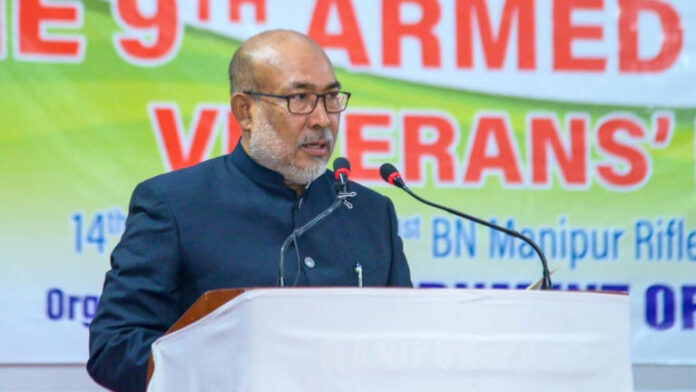Amid the ongoing unrest in Manipur, Chief Minister N. Biren Singh has called for enhanced coordination among security forces to restore peace and stability in the troubled state. The demand comes in light of escalating ethnic tensions, violent clashes, and security challenges that have gripped the region in recent months.
The Context of the Unrest
Manipur has been facing a severe law-and-order crisis fueled by ethnic conflicts, socio-political disputes, and insurgent activities. The violence, which began in May 2023, has resulted in significant loss of life and displacement of thousands. The clashes between the Meitei and Kuki communities have been at the heart of the turmoil, with each side accusing the other of perpetuating violence.
The state’s unique geographical and cultural composition, coupled with its history of insurgency, has made the situation particularly volatile. The presence of multiple armed groups and the region’s proximity to international borders further complicate the security dynamics.
Biren Singh’s Call for Action
In a high-level meeting with senior officials from the Indian Army, paramilitary forces, and state police, Chief Minister Biren Singh stressed the importance of unified action to quell the unrest. He emphasized that a lack of coordination among security forces could hinder efforts to restore normalcy.
Key Points Highlighted by the Chief Minister:
- Joint Operations: Singh called for joint operations involving the Army, Assam Rifles, and state police to dismantle insurgent camps and neutralize armed groups.
- Improved Intelligence Sharing: He urged agencies to enhance intelligence-sharing mechanisms to preempt and prevent violent incidents.
- Community Engagement: Singh stressed the need to build trust with local communities through outreach programs and confidence-building measures.
- Border Security: Given Manipur’s porous borders with Myanmar, the Chief Minister highlighted the urgency of strengthening border surveillance to curb the influx of weapons and insurgents.
Challenges Faced by Security Forces
The unrest in Manipur presents several challenges for security forces:
- Difficult Terrain: The state’s hilly and forested regions make it challenging to conduct operations and maintain surveillance.
- Ethnic Divisions: The ethnic divide has also affected the composition of state forces, with allegations of bias adding to the mistrust among communities.
- Armed Groups: The presence of multiple insurgent groups with conflicting agendas complicates the task of restoring order.
- Humanitarian Concerns: Ensuring the safety of displaced civilians and providing humanitarian aid remain pressing priorities.
Steps Taken by the Government
The state and central governments have taken several steps to address the crisis:
- Deployment of Additional Forces: Thousands of central paramilitary personnel have been deployed to assist local authorities in maintaining law and order.
- Curfews and Internet Bans: Authorities have imposed curfews and temporary internet shutdowns in sensitive areas to prevent the spread of misinformation and control violence.
- Peace Talks: Efforts are underway to facilitate dialogue between the warring communities and insurgent groups.
- Relief Measures: Camps have been set up to provide shelter, food, and medical aid to those displaced by the violence.
The Role of Civil Society
Civil society organizations and local leaders have also stepped in to mediate and promote peace. Community-driven initiatives, such as peace marches and dialogue sessions, aim to foster reconciliation and reduce tensions. Women’s groups, in particular, have played a significant role in advocating for an end to violence and the protection of vulnerable populations.
The Path Forward
While the challenges in Manipur are complex, a coordinated and inclusive approach offers hope for resolution. Key priorities moving forward include:
- Long-Term Reconciliation: Addressing the root causes of the ethnic conflict through sustained dialogue and equitable development.
- Institutional Reforms: Strengthening local governance and law enforcement to build trust among communities.
- Economic Development: Investing in infrastructure, education, and employment opportunities to address socio-economic disparities.
Conclusion
The unrest in Manipur underscores the need for strong leadership, strategic coordination, and community involvement to restore peace. Chief Minister Biren Singh’s call for stronger cooperation among security forces is a critical step in addressing the immediate crisis. However, lasting peace will require a multifaceted approach that addresses both the symptoms and root causes of the conflict. By fostering unity and resilience, Manipur can pave the way for a more harmonious and prosperous future.




